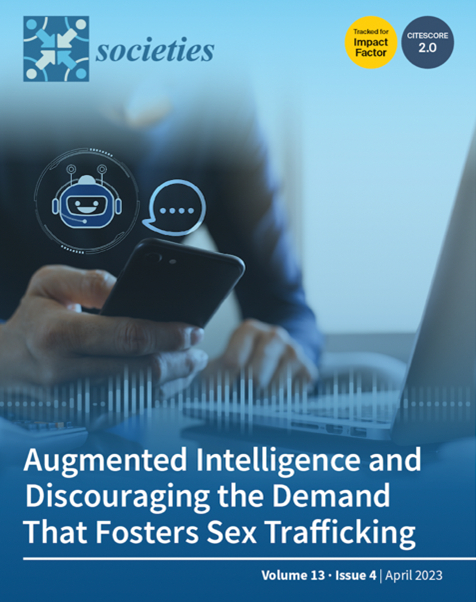Meet Gracie.
Gracie is an artificial intelligence chatbot that is being used to disrupt sexual exploitation.
Launched by Street Grace, Gracie intercepts men who are looking to purchase sexual access to prostituted persons or sex trafficked children. “She” then sends these men deterrence messages that communicate the risks and consequences of their behavior.
Gracie’s work ethic is unmatched. In a mere 5-month period, Gracie has:
- reached 25 States and 78 Cities
- exchanged more than 54,000 messages with people intent on purchasing sexual access to adults and children alike
- reported more than 6000 would-be predators to law enforcement agencies.
Not only is Gracie streetwise in that she responds to the prompts by would be predators in convincing slang and SMS lingo, but her 112 distinct adolescent personas have been effective in revealing the criminal intent of countless sex buyers. The value of Gracie is poignantly summarized by Jamie Caruthers, Director, Demand Reduction and Policy, at Street Grace:
“Every conversation that a would-be sex buyer has with Gracie is a conversation that he/she isn’t having with a real minor, and some of the conversations will result in a buyer being brought to justice.”
Augmented Intelligence as the New Frontier in Combatting Online Sexual Exploitation
Augmented intelligence—the fusion of human and artificial intelligence (AI)—is flourishing and primed for further expansion in response to a spectrum of risks and crimes that stem from the online sexual exploitation marketplace. This is discussed at length in NCOSE’s new research paper entitled ‘Discouraging the Demand That Fosters Sex Trafficking: Collaboration through Augmented Intelligence,’ that was published and selected as the cover story for the journal Societies.

The paper stems from a National Institute of Justice grant funded study that was completed by NCOSE’s Research Institute. The study documented 15 demand reduction tactics that were used in more than 2,650 US cities and counties to deter men from purchasing sexual access to prostituted persons. Technology-based enforcement and deterrence methods have been used in more than 78 locations in the United States, and the paper provides illustrative case studies that show how Street Grace and the Epik Project (Epik) employ technology that utilizes the complementary strengths of humans and machines to deter sex buyers at the point of purchase.
The publication of the paper was followed by an insightful conversation with Jamie Caruthers of Street Grace, and Tom Perez, Founder and CEO of Epik, during a Facebook Live event that touched on a range of experiences that stem from the work of the two organizations.
The second organization discussed in the paper, Epik, uses a powerful stack of technologies to address consumer-level demand at the point of purchase. More than 250,000 attempts by an estimated 125,000 men intent on buying sexual access to another person have been logged by Epik. These interruptions have led to tens of thousands of meaningful conversations. Epik has trained more than 300 men to disrupt the demand for sexual exploitation in 21 U.S. cities, and these teams conduct “Cyber Patrols” over 20 nights per month. The organization takes a proactive outreach approach to sex buyers, and this is where technology plays a substantial role. By leveraging technologies such as Artificial Intelligence and Natural Language Processing, Epik focuses its efforts on those men more open to change and to continual learning.
The human(e) touch of these leaders and their teams, combined with their use of artificial intelligence, machine learning, and mobile technology, show significant potential for operational scaling, and provide much consideration for countrywide replication in future consumer-level demand reduction efforts in the United States.
The Vice and Value of AI Developments
NCOSE has ramped up its strategic focus on all-things technology and artificial intelligence and keeps a keen eye on both the vice and the value that stem from emerging technologies. We have recently added our voice of concern and joined the call by industry leaders like Bill Gates, Elon Musk, Steve Wozniak, Tristan Harris, and more than 50,000 people pertaining to the unfettered AI race. We have also drawn attention to Snap’s dangerous new AI that risks exposing children to sexual exploitation and abuse.
Despite these concerning developments, the potential of technology-for-good is significant and very exciting. As found in our research on augmented intelligence and efforts to discourage the demand that fosters sex trafficking, winsome collaborations between law enforcement, the technology industry, and anti-trafficking stakeholders are taking place, and valuable insights for capacity building in areas of Internet monitoring and undercover online investigations as possible responses to sex trafficking are available for implementation.
Technology is here to stay— however, a human-AI partnership that is guided by the principles of transparency, justice and fairness, non-maleficence, and responsible use is what must be pursued and embraced.
ACTION: Ask Your Legislators to Combat Sex Buying!
Deterring sex buyers is the only way to truly shrink the sexual exploitation market and end sex trafficking. Please take 30 seconds to complete this quick action form, asking your local elected officials to adopt policies that increase accountability for sex buyers!


